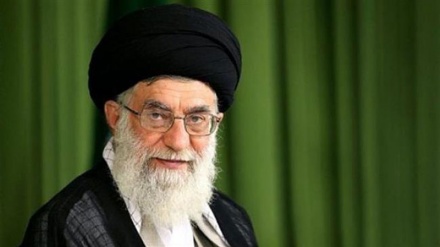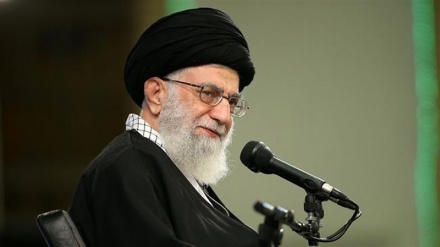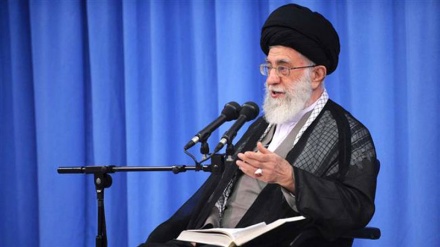In Presence of the Sun (97)
As a reminder, for the few past weeks we have been discussing the status of women in Islam and the personality of Lady Fatimah Zahra as the best role model for women. No we want to know more of the views of Ayatollah Seyyed Ali Khamenei in this regard.
Speaking on the lofty status of Hazrat Fatimah (Peace be upon her), the leader says, “In fact Fatimah Zahra is a radiant dawn through which the sun of Imamate, Wilayah and Prophethood has shone. She is the lofty sky in whose lap the luminous stars of Wilayah have been placed. All Imams (Peace upon them) would so much venerate and glorify their mother that few people receive so much respect and veneration by them.”
From the words of the Ahl al-Bayt (the infallible progeny of the Prophet) on Fatimah Zahra one understands that this great lady was plunged in light and spirituality. In view of the Leader of the Islamic Revolution the great lesson of the life of Hazrat Zahra for us is to live purely and move righteously. A life of devotion, chastity, struggle and jihad is the life of Fatimah which can lead mankind in the way of perfection.
The unmatched characteristics of Hazrat Zahra (Peace upon her) are so luminous and impeccable that she has turned into the greatest lady throughout history. Her behavior toward husband, children and parents show the best example for obeying. However, Ayatollah Khamenei points to her servitude to God as her highest merit.
Ayatollah Khamenei believes that Muslims are duty-bound to follow the path of Hazrat Fatimah to reach the lofty pinnacles of eternal salvation and bliss.
Helping the needy and the destitute is another characteristic of the Prophet’s daughter. This was so evident that God revealed a surah (chapter) in praise of the selflessness of Fatimah Zahra, her husband and her children. The great hadith narrator, Ibn Abbas says on the occasion of the revelation of surah Dahr (Insan) of the holy Qur’an: Hassan and Hussein (Peace upon them) were sick. Prophet Mohammad (SAWA) paid a visit to them along with some of his companions. Then the Prophet told Imam Ali (Peace upon him) to pledge a vow for the healing of his children.
Imam Ali and Hazrat Zahra (Blessings of God upon them) vowed that if their sons were healed they would fast for three days. What is interesting that their sons also joined them in fasting. After healing they fasted the first day while they had no food at home. Thus, Imam Ali (Peace upon him) borrowed some barley for bread. Lady Fatimah (Peace upon her) made five loaves of bread from one third of the barley. At the time of iftar (breaking the fast) a beggar came at the door saying, “Greetings to you the household of the Prophet! I am poor. Give me some food. May God bestow you from the foods of paradise.” They gave their food to the poor man and broke their fast with water. On the eve of the second day an orphan came to the door asking for food. Thus, they gave their food and broke their fast with water. The third day, also, a captive came and asked for food. Again they gave their food and broke their fast with water.
The following morning Imam Ali (AS) took Hassan and Hussein (Peace upon them) to the Prophet. Prophet Mohammad (SAWA) told them, “Seeing you in this way is very difficult for me.” Then he accompanied them to the house of Fatimah. He saw Fatimah at the state of prayer while she had become so thin and weak. At this moment Archangel Gabriel came down with the ayahs of surah Dahr. In ayah 8 of the surah God says, “They give food, for the love of God, to the needy, the orphan and the captive.”
Ayatollah Khamenei says, “Don’t we say that noble lady acted in a way that surah Dahr was revealed about her, her husband and her sons? Selflessness toward the poor and helping the deprived at the cost of one’s hunger. We, too, should do these things. We cannot claim the love of Fatimah Zahra while that noble lady, for the sake of the hungry, would take from herself and her dear ones- like Hassan and Hussein and her father- and give to the poor; not just for one day or two days, for three days! We must demonstrate their life in our life though in a weak way.”
Imam Hassan (AS) has been narrated to say on his mother, “One night my mother stood for prayer till the time of dawn. I heard her praying for every faithful man and woman. In the morning I asked her, ‘Mother, why didn’t you pray for yourself as you prayed for others?’ She answered, ‘Dear son, first the neighbors and then ourselves.”
This is great lesson for us. This is the lofty spirit of piety which relieves man from the bondages of egotism.
Leader of the Islamic Revolution, Ayatollah Khamenei says, “The life of Fatimah Zahra (Greetings of God upon her), in all dimensions, is a life of labour, effort and spiritual perfection and sublimity. Her young husband is constantly at the battlefront and war theater. However, in spite of the problems of the environment and life, Fatimah Zahra (Greetings of God upon her) is like a focal point for the people and Muslims to refer to. She is the Prophet’s daughter who solves the problems and- in these conditions- leads the life honorably: she trains children like Hassan, Hussein and Zainab; takes care of a husband like Ali and attracts the satisfaction of a father like the Prophet! Even in the time of conquests and war spoils the Prophet’s daughter doesn’t allow the minutest of the worldly pleasures and luxuries- and the things that attract the hearts of young girls- enter her heart. The worship of Fatimah Zahra (SA) is an exemplary worship.”
Elsewhere in his remarks, the leader elaborates, “Those throughout history- whether in the old Jahilia or the Jahilia of the 20th century- have tried to humiliate and demean woman, introduce her as enthralled with the outward trappings and ornaments, to make her captive of fashion, clothes, make-up, gold and jewelry, and display her as a means of life pleasures- while they take practical steps in this regard- their logic melts down like snow and ice and perishes before the heat of the sun of Fatimah Zahra’s spiritual status.
Islam introduces Fatimah- that prominent and exquisite divine element- as an exemplary and model woman. On the one hand there are her apparent life, jihad, struggle, knowledge, oration, self-sacrifice, taking care of husband, motherhood, taking care of husband, migration and participation in every political, military and revolutionary fields and her all-out prominence which causes great men to humble before her; while on the other hand there are her spiritual status, genuflection, prostration, mihrab of worship, prayer, her Sahifa, her humble beseeching to God, her divine nature, her spiritual radiance and her being equal and peer for the Commander of the Faithful and the Prophet. This is the role model of a woman that Islam intends to make.”
RM/ME


